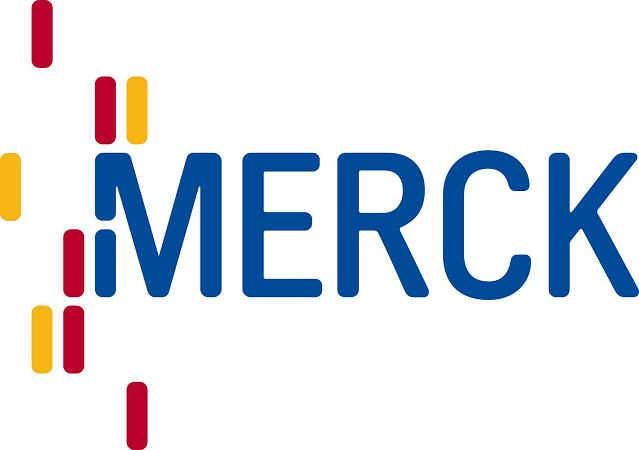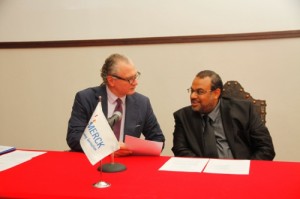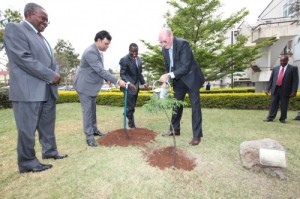Merck kicks off its second year fight against diabetes by adopting e–learning solutions to build healthcare capacity in Africa
- Merck is reaching to health professionals in rural areas by providing SMS and e-learning platform for diabetes
- Merck is bringing international diabetes experts to eight African universities in seven Sub-Saharan countries
Merck, the world’s oldest pharmaceutical and chemical company has started its second year of its five year project to provide European Accredited Clinical Diabetes Management course for medical and pharmacy students in African Universities by introducing E-Learning.
The German pharmaceutical and chemical giant is implementing a well structured and coherent Corporate Social Responsibility strategy that features a medical education Africa tour to improve diabetes healthcare in Africa.
At the beginning of September 2014, Merck Capacity Advancement Program (CAP) will kick off its second year of the Clinical Diabetes Management Program to medical and pharmacy students in University of Nairobi (UoN).
Merck will provide the same course to medical students of Makerere University, Uganda and University of Namibia.
At the end of September 2014, Merck CAP will provide the same course addressing chronic diseases management focusing on Diabetes and hypertension. The course will be offered in Portuguese by International and local professors to medical students at University Eduardo Mondlane, Mozambique and Katyavala Bwila University, Angola.
In November 2014, Merck will head to Tanzania where they will provide the clinical diabetes management course to medical students of Muhimbili University of Health and Allied Science before extending the same to University of Ghana and Kwame Nkrumah University of Science and Technology in Ghana.
Every healthcare provider in those countries and the rest of Africa will have free access to all the lectures on a dedicated website and will be able to undergo an assessment to obtain CME hours on line.
Dr Stefan Oschmann, Merck Pharma CEO emphasized “ Merck is supporting E- Health which can definitely contribute to bringing healthcare to unserved or underserved populations; increasing the effectiveness and reducing the costs of healthcare delivery; improving the effectiveness of public health programmes and research; preventing illness and managing and treating chronic diseases.”
“Merck is confident that supporting this E- learning platform for the diabetes educational program will definitely improve the access to innovative and high quality healthcare solution and disease awareness which will contribute significantly to the economical and social development in Africa”. He added.
Rasha Kelej, the head of Global Market Development and Business Responsibility of Merck Serono said, “Using the power of mobile and internet technologies to share information via SMS or dedicated website to healthcare providers and the general public across Africa especially in rural areas, will help to increase access to training, education and raise awareness on the issues of diabetes so that they learn to better prevent, diagnose and manage the disease, such as the websites for Africa Continues Medical Education ( CME) tour for physicians in rural areas”.
In 2014, Merck aims to reach 2,000 students and rural healthcare providers so that ultimately they become Diabetes ambassadors across Africa.
In 2015, the programme will be extended to more universities across Africa such as Nigeria and Ethiopia and in Asia such as Indonesia and India.
Merck Capacity Advancement Program – CAP aims to reach at least 9,000 students by 2018, with information on how to better diagnose, manage and prevent the deadly silent disease.
Diabetes is one of the rising killer diseases globally, claiming one life every eight seconds and a limb lost at every 30 seconds, according to reports from World Health Organization and the International Diabetes Federation (IDF).
The challenges faced by African countries in tackling diabetes are well known: services for the care of chronic diseases are poorly organized; public awareness about the diabetes is limited, and well-structured education programmes for patients and health professionals are not available
In addressing these challenges, Merck has shown consistent approach to their corporate social responsibility agenda in Africa since 2013.
In March 2013 – Merck Germany announced the launch of its Capacity Advancement Program (CAP) in Namibia. This was after conducting a stakeholders committee with the Principals, deans and faculty members of African universities on board to discuss the learning gaps of medical students and healthcare professional in their countries with special focus on diabetes. Dr Stefan Oschmann, Merck Pharma Chief Executive Officer chaired this committee at Namibia University.
Professor Isaac O. Kibwage, Principal of the College of Health Sciences University of Nairobi commented: “University of Nairobi is ready to support initiatives such as Merck’s Capacity Advancement Program and associate with other institutions whose overall objectives and goals are directed towards alleviating challenges in the provision of healthcare especially emerging diseases such as Diabetes”.
In October 2013, Merck set up an office in Nairobi, Kenya, with an aim of increasing its presence in the East African pharmaceutical market, reinforcing its interest in the Africa.
The Cabinet Secretary, Ministry of Health, Mr James Macharia welcomed the strategic partnership with Merck and he applauded Merck for its Capacity Advancement Program – CAP that was launched earlier in the same year.
In late November 2013, Merck announced the launch of the first year of a European accredited clinical diabetes management programme as a part of the Merck Capacity Advancement Program (CAP) at the University of Nairobi (Kenya), Makerere University (Uganda) and the University of Namibia (Namibia). The program has reached more than 1000 students then.
Highlighting Merck’s ongoing commitment to raise the awareness s of diabetes in The Sub- Saharan Africa, in December 2013, Merck launched their first Diabetes awareness Campaign in Uganda and Kenya. The campaign dubbed , “Get Active Get Informed Get Healthier” has reached around 3,000 community members with free screening and education about how to prevent and manage diabetes by eating healthy & balanced diet, exercising regularly and taking their prescribed medication.
During the Diabetes Campaign, Eva Muchemi, Executive Director of the Diabetes Management and Information Centre (DMI) said “Merck has been dedicated to fight against diabetes via their Capacity Advancement Program and Diabetes awareness campaign. This is a great initiative that Diabetes Management and Information Centre (DMI) welcome,” she added.
In February 2014, Merck announced a strategic partnership with Mozambique Ministry of Health and launched their Diabetes Medical Education Program at Universidade Eduardo Mondlane as part of its Capacity Advancement Program in Mozambique.
Mozambique Minister of Health, Dr. Alexander Manguele applauded Merck for their entry to Mozambique market and for their CAP.
The Dean of medical school, Prof. Mohsin Sidat emphasized that Universidade Eduardo Mondlane is happy to partner with Merck to implement their Capacity Advancement Program (CAP) and to support chronic disease health care will help tackle the ever rising diabetes prevalence rate in Mozambique.
Late March 2014, the company launched an SMS diabetes awareness campaign in Uganda in partnership with Uganda Ministry of Health, the Makerere University and the Uganda Diabetes Association.
The SMS campaign will target patients and the general public, healthcare providers and medical students across Uganda, with a special focus on rural areas, and will work to provide information to better prevent, diagnose and manage the disease.
Uganda Minster of State of Health, Sarah Opendi informed the gathering that sharing information via SMS to healthcare providers and the general public across Uganda especially in rural areas will help raise awareness on the issues of diabetes so that they learn to better prevent, diagnose and manage the disease.
“Merck’s initiative to utilize mobile technology in order to promote public awareness and early detection of the disease will strengthen health systems by improving their capacity to effectively prevent and control NCDs,” she added.
“Because of the lack of awareness on disease symptoms many diabetes patients are diagnosed late when they have already developed complications such as blindness, foot ulcers, gangrene, heart diseases etc. Merck is dedicated to fight diabetes via its Capacity Advancement Program and Diabetes awareness campaigns. This is a great initiative that we welcome,” said Dr. William Lumuh, the President of the Uganda Diabetes Association.
Merck has also signed a (memorandum of understanding (MoU) with Makerere University in order to establish a scientific collaboration in the Research and Development field. “This is part of our commitment to advancing healthcare capacity and providing sustainable access to high-quality health solutions and safe medicines in Africa,” explained Dr Kai Beckmann, Member of the Executive Board and Chief Administration Officer of Merck.
In April 2014, Merck launched its Capacity Advancement Program in Ghana. The German Company has successfully formed a strategic partnership with University Of Ghana, Kwame Nkrumah University, Pharmaceutical Society of Ghana, Ghana Medical Association and Ghana National Association of Diabetes in order to contribute to the country’s social and economic development.
During his visit to University of Ghana, Frank Stangenberg-Haverkamp, Chairman of the Executive Board and Family Board of E. Merck KG and member of the Merck family, said: “Merck is pleased to launch the Merck Capacity Advancement Program in Ghana as part of our commitment to building healthcare capacity in Africa”.
The President of Pharmaceutical Society of Ghana Pharm-PSGH, James Ohemeng Kyei emphasized that the PSGH is proud to participate actively in the 5-year Merck Capacity Advancement Program (CAP) which will improve the accessibility and capacity of diabetes healthcare in Ghana. He said: “The partnership with Merck to implement the Capacity Advancement Program in Ghana and to support chronic disease healthcare will help us to tackle the ever rising diabetes prevalence rate.”
The President of Ghana National Association for Diabetes, Elizabeth Esi Denyoh, explained: “There is unknown number of people who died from lack of proper management, coupled with ignorance of the disease in Ghana. Therefore it is an evident that with such support diabetes will be better managed and even preventable as information on the disease spreads across the nation.”
Dean of Medical School of university of Ghana, Prof. Jennifer Welbeck, stated that we are looking forward to the clinical diabetes management course that will provide Diabetes awareness to our undergraduates and healthcare providers across in Ghana.
The course will run in November 2014 in both Accra and Kumasi targeting more than 1000 students and Healthcare providers.
Elcin Ergun, the Head of Global Commercial Operation of Merck Serono, explained: “We are fully committed to partner with Governments, Universities, Healthcare institutions and Patients Associations in Ghana and the rest of Africa to develop and deliver solutions to expand healthcare capacities and improve access to health as part of the Merck Capacity Advancement Program”.
Merck is now the key partner of Communities, Academia and local authorities, several Public Private Partnerships with national and local stakeholders have been built to ensure the successful implementation and outcomes delivery of the program.
Rasha kelej , emphasized “It is very disturbing to know that such silent deadly disease has found its way to Africa and had a such huge economic and social burden on the continent. Africa has its share of communicable and NTDs therefore its healthcare system is built to only tackle them”
She added “Merck plays a great role to build healthcare capacity in Africa with special focus on diabetes and chronic diseases. It is clear that if not addressed as a matter of urgency, diabetes, will soon threaten the economic viability of Africa. And sadly, many people who survive HIV and AIDS may die of diabetes”.
The lack of financial means is not the only challenge in Africa, but a scarcity of trained health care personnel capable to tackle the prevention, diagnosis and management of diabetes at all levels of the health care systems.
Dr Stefan Oschmann, Merck Pharma CEO stated; “Merck has longstanding experience in managing this disease. Therefore, we are willing to share our knowledge with healthcare practitioners and medical and pharmacy students in Africa. On this we are partnering with Ministries of health, Health science universities, local research institutions, patient associations, community and media in supporting the development of the educational program to cover all the learning gaps of the disease management.”
According to IDF, The number of people with diabetes in Africa would double by 2035. The proportion of deaths due to diabetes in people under 60ys old in Africa is 76% and 46% of people living with diabetes are still undiagnosed.






